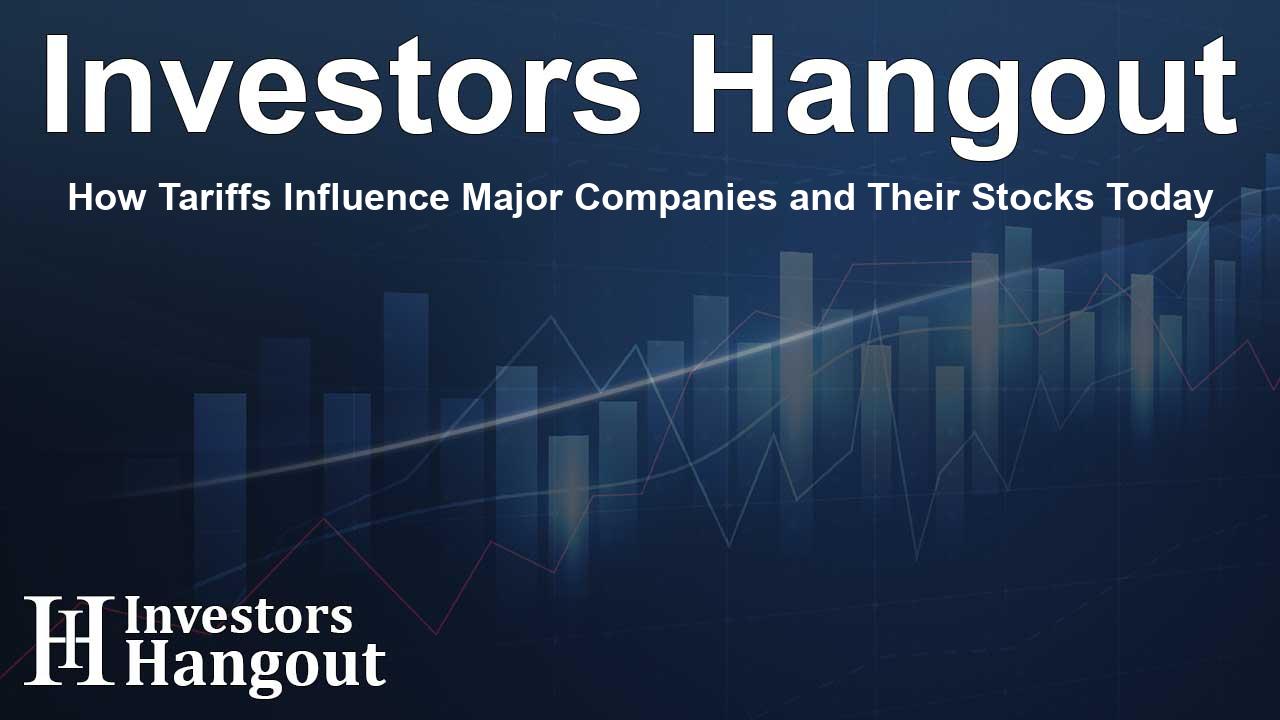How Tariffs Influence Major Companies and Their Stocks Today

Understanding the Impact of Recent Tariffs
In today's ever-changing market landscape, understanding how new tariffs affect various industries is crucial for investors. With recent announcements from the government regarding tariffs on various sectors, companies like Intel Corp (NASDAQ: INTC), Eli Lilly and Co (NYSE: LLY), and PACCAR Inc (NASDAQ: PCAR) are poised for notable market movements. Here’s a detailed look into how these changes can benefit or challenge major players in the economy.
New Tariff Regulations
The introduction of new tariffs set to take effect shortly reflects the government’s strategy to influence purchasing behavior and protect domestic industries. These tariffs impact sectors differently, creating both opportunities and challenges for companies and investors alike.
Pharmaceuticals and Health Sector
The announcement of a 100% tariff on imported pharmaceuticals has created ripples throughout the health sector. Companies like Eli Lilly (NYSE: LLY) stand to benefit significantly, as they have already committed to increasing domestic manufacturing. In contrast, competitors like Novo Nordisk A/S (NYSE: NVO) may face headwinds due to these changes. Investors keeping a close eye on these shifts can find opportunities amid the volatility.
Automotive and Heavy Industries
PACCAR Inc (NASDAQ: PCAR), a leader in the trucking industry, is now witnessing favorable conditions thanks to the implementation of a 25% tariff on imported heavy trucks. This environment allows PACCAR to strengthen its market position. Conversely, rising costs may present challenges for companies relying on these imports.
Furniture and Cabinetry Sectors
An unexpected effect of the recent tariffs includes a substantial 50% levy on imported cabinetry, positively impacting companies like American Woodmark Corp (NASDAQ: AMWD). Firms such as La-Z-Boy (NYSE: LZB) that deal in upholstered furniture now face a 30% tariff. This uneven playing field is crucial for investors analyzing market strategies.
Tech Sector Adjustments
The technology sector is also feeling the pressure under the new tariff regime. Companies like Intel Corp (NASDAQ: INTC) and GlobalFoundries Inc (NASDAQ: GFS) are adjusting strategies in anticipation of new requirements that demand a higher ratio of domestically manufactured semiconductor chips. This significant move can bolster investment in tech manufacturing, securing jobs and industrial growth in the long term.
Consumer Spending Insights
On the consumer front, data indicates a strong inclination towards spending, with reports showing personal spending outpacing forecasts. Such consumer behavior highlights the vital role that economic conditions play in stock performance and company revenue generation.
Investment Strategies Amid Market Changes
In light of these shifting dynamics, investors may consider recalibrating their strategies. Holding long-term positions in companies benefiting from new tariffs might be wise. Developing a protective stance with cash reserves or employing short-term trades to hedge against unexpected market changes could serve as suitable strategies during such turbulent times.
Conclusion: Navigating the Market
The current market conditions offer an intense mix of challenge and opportunity. The new tariffs set by the government are reshaping various sectors, from pharmaceuticals to technology, providing investors with plenty to think about. Keeping informed and adjusting strategies based on these developments will be critical for investors looking to thrive.
Frequently Asked Questions
What are the new tariffs affecting?
The new tariffs primarily affect pharmaceuticals, heavy trucks, cabinetry, and upholstered furniture among other sectors.
How might Eli Lilly benefit from the new tariffs?
Eli Lilly is poised to benefit from a lack of tariffs on its imports due to its commitment to building U.S. manufacturing plants.
What percentage of tariffs are placed on heavy trucks?
A 25% tariff is imposed on heavy trucks imported into the country.
How are technology companies responding to new tariffs?
Tech companies like Intel are adjusting their manufacturing strategies to ensure compliance with domestic production mandates.
Why is consumer spending relevant for investors?
Higher consumer spending indicates economic strength, which directly impacts company revenues and stock performance.
About The Author
Contact Thomas Cooper privately here. Or send an email with ATTN: Thomas Cooper as the subject to contact@investorshangout.com.
About Investors Hangout
Investors Hangout is a leading online stock forum for financial discussion and learning, offering a wide range of free tools and resources. It draws in traders of all levels, who exchange market knowledge, investigate trading tactics, and keep an eye on industry developments in real time. Featuring financial articles, stock message boards, quotes, charts, company profiles, and live news updates. Through cooperative learning and a wealth of informational resources, it helps users from novices creating their first portfolios to experts honing their techniques. Join Investors Hangout today: https://investorshangout.com/
The content of this article is based on factual, publicly available information and does not represent legal, financial, or investment advice. Investors Hangout does not offer financial advice, and the author is not a licensed financial advisor. Consult a qualified advisor before making any financial or investment decisions based on this article. This article should not be considered advice to purchase, sell, or hold any securities or other investments. If any of the material provided here is inaccurate, please contact us for corrections.
